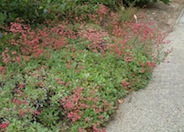
Common name:Glossy Abelia, White Abelia
Botanical name:Abelia X grandiflora
Abelia X grandiflora is a semi-evergreen shrub of medium size. It
has small, white, fragrant flowers that bloom from spring through the fall season. Bracts add a bronzy tint to the flowers. Abelia makes a good sheared hedge or screen. Unsheared it is naturally arching

Common name:Red Buckwheat
Botanical name:Eriogonum grande rubescens
Red Buckwheat is a low growing woody perennial 1-2 ft high and 3 ft. wide. It has showy dark pink summer flowers that stand out against small gray-green foliage. It is a California native that is drought tolerant. It attracts butterflies and
benefical insects. - Cornflower Farms

Common name:Blue Sage
Botanical name:Salvia 'Allen Chickering'
The Allen Chickering sage is a perennial shrub that grows 2-5 ft. high and 2-4 ft. wide . It has blue flowers that bloom in the spring and summer. This shrub is native to California and is drought tolerant.
-Cornflower Farms

Common name:Catmint
Botanical name:Nepeta X faassenii
Nepeta faassenii makes soft, gray-green, undulating mounds o 1.5 ft. high in bloom. The small leaves are attractive to cats. This perennial has lavender blue flowers in late spring, and early summer.

Common name:Blue Blossom Ceanothus
Botanical name:Ceanothus thyrsiflorus 'Skylark'
The blue blossom ceanothus is a shrub that has dark blue flower clusters that bloom profusely . This smaller growing selection grows to 6' H x 4-6' W. This shrub attracts butterflies, hummingbirds and beneficial insects. Its native counterpart
can be found from sea level to 1500 ft. elevations in mixed evergreen and redwood forests of the Coast Ranges. -Cornflower Farms (edited)
Sustainable landscaping is a term coined to mean sensible landscape practices that work within the limits of the Eco-system. This means within the limits of your local rainfall, soil conditions and sun patterns.
Click in the green box for more information
In the natural world the endless cycle of birth, growth, decay, death and rebirth flows throughout the seasons. Plants die, leaves fall and new growth springs up in its place. Nothing is lost and the fallen leaves and dead plants decay into the soil, enriching it for the next generation of growth.
Click in the green box for more information
Designer: Kat Weiss Landscape Design
Photographer: GardenSoft
Incorporate compost 6" into your soil to retain water, reduce compaction, feed earthworms, and provide valuable nutrients to your plants.
Drip and other smart irrigation delivers water directly to roots, allowing no excess water for weeds.